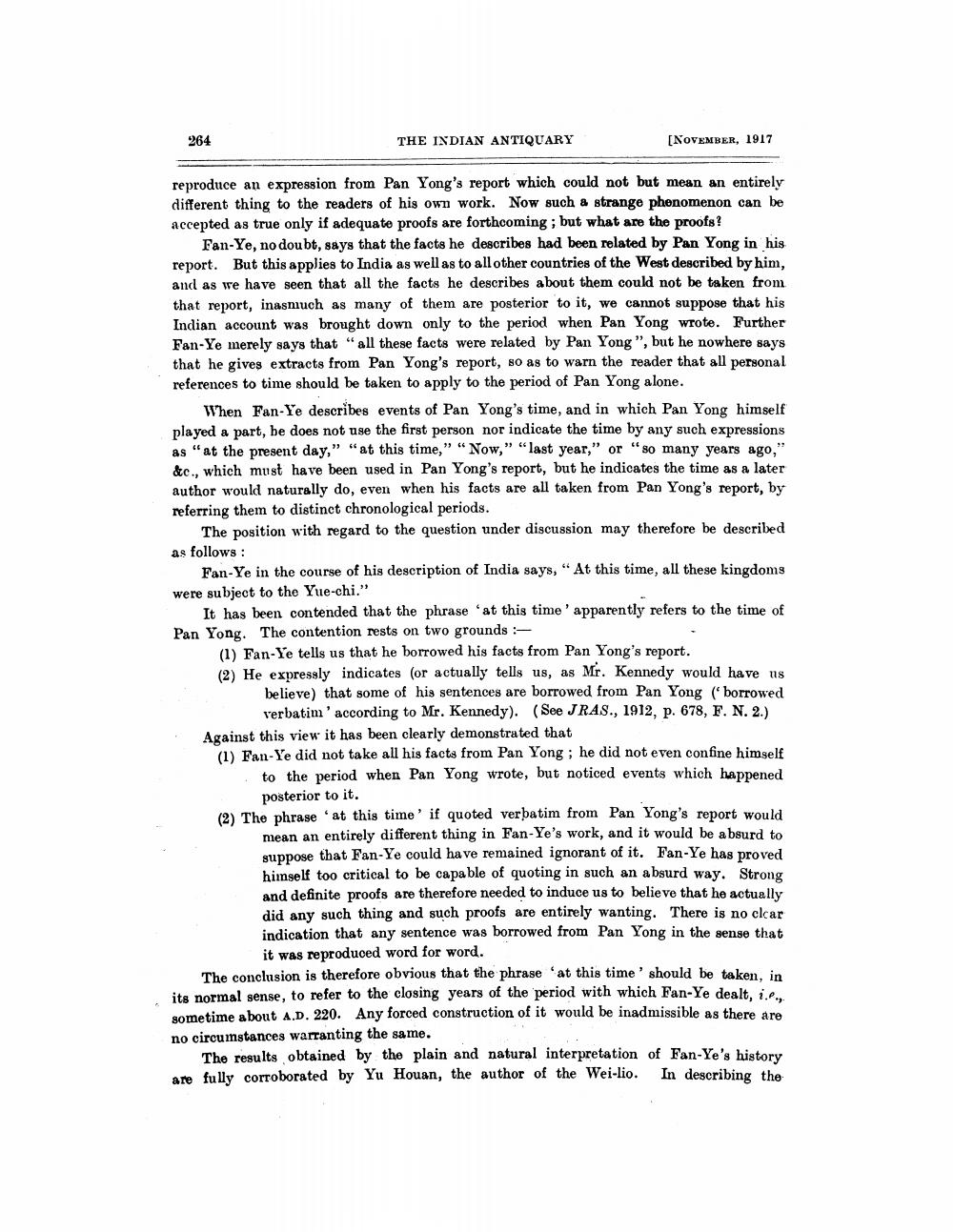________________
264
THE INDIAN ANTIQUARY
[NOVEMBER, 1917
reproduce an expression from Pan Yong's report which could not but mean an entirely different thing to the readers of his own work. Now such a strange phenomenon can be accepted as true only if adequate proofs are forthcoming ; but what are the proofs?
Fan-Ye, no doubt, says that the facts he describes had been related by Pan Yong in his report. But this applies to India as well as to all other countries of the West described by him, and as we have seen that all the facts he describes about them could not be taken from that report, inasmuch as many of them are posterior to it, we cannot suppose that his Indian account was brought down only to the period when Pan Yong wrote. Further Fan-Ye merely says that “all these facts were related by Pan Yong", but he nowhere says that he gives extracts from Pan Yong's report, so as to warn the reader that all personal references to time should be taken to apply to the period of Pan Yong alone.
When Fan-Ye describes events of Pan Yong's time, and in which Pan Yong himself played a part, he does not use the first person nor indicate the time by any such expressions as "at the present day," "at this time," "Now," "last year," or "so many years ago," &c., which must have been used in Pan Yong's report, but he indicates the time as a later author would naturally do, even when his facts are all taken from Pan Yong's report, by referring them to distinct chronological periods.
The position with regard to the question under discussion may therefore be described as follows:
Fan-Ye in the course of his description of India says, "At this time, all these kingdoms were subject to the Yue-chi."
It has been contended that the phrase "at this time' apparently refers to the time of Pan Yong. The contention rests on two grounds
(1) Fan-Ye tells us that he borrowed his facts from Pan Yong's report. (2) He expressly indicates (or actually tells us, as Mr. Kennedy would have us
believe) that some of his sentences are borrowed from Pan Yong (borrowed
verbatim' according to Mr. Kennedy). (See JRAS., 1912, p. 678, F. N. 2.) Against this view it has been clearly demonstrated that (1) Fan-Ye did not take all his facts from Pan Yong; he did not even confine himself
to the period when Pan Yong wrote, but noticed events which happened
posterior to it. (2) The phrase at this time' if quoted verbatim from Pan Yong's report would
mean an entirely different thing in Fan-Ye's work, and it would be absurd to suppose that Fan-Ye could have remained ignorant of it. Fan-Ye has proved himself too critical to be capable of quoting in such an absurd way. Strong and definite proofs are therefore needed to induce us to believe that he actually did any such thing and such proofs are entirely wanting. There is no clar indication that any sentence was borrowed from Pan Yong in the sense that
it was reproduoed word for word. The conclusion is therefore obvious that the phrase "at this time should be taken, in its normal sense, to refer to the closing years of the period with which Fan-Ye dealt. ie. sometime about A.D. 220. Any forced construction of it would be inadmissible as there are no circumstances warranting the same.
The results obtained by the plain and natural interpretation of Fan-Ye's history are fully corroborated by Yu Houan, the author of the Wei-lio. In describing the




